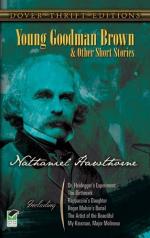|
This section contains 1,250 words (approx. 5 pages at 300 words per page) |

|
SOURCE: “Antinomianism in ‘Young Goodman Brown,’” in Studies in Short Fiction, Vol. 3, No. 1, Fall, 1965, pp. 73-75.
In the following essay, Mathews suggests that Brown's passivity—the result of his antinomianist belief that he is saved regardless of his personal actions—leads him into error and doom.
Almost everyone commenting on Nathaniel Hawthorne's “Young Goodman Brown” has noted that its general theme is the loss of personal faith. On the specific application of certain symbols, however, there has been a good deal of disagreement. Some time ago Thomas E. Connolly re-asserted the paramount allegorical significance of the character Faith and justifiably concluded that “this story is Hawthorne's criticism of the teachings of Puritanic-Calvinism,”1 though he limited the object of Hawthorne's criticism to predestination. Giving further scrutiny to Faith can establish a more specific probability of meaning, which converts to theological terms Hawthorne's ubiquitous thesis that the most serious personal...
|
This section contains 1,250 words (approx. 5 pages at 300 words per page) |

|


